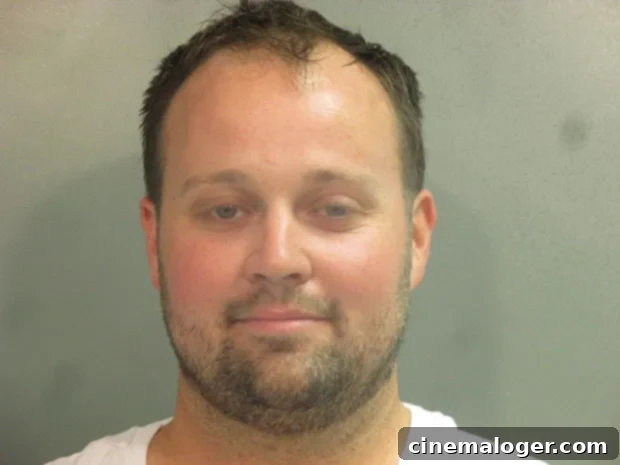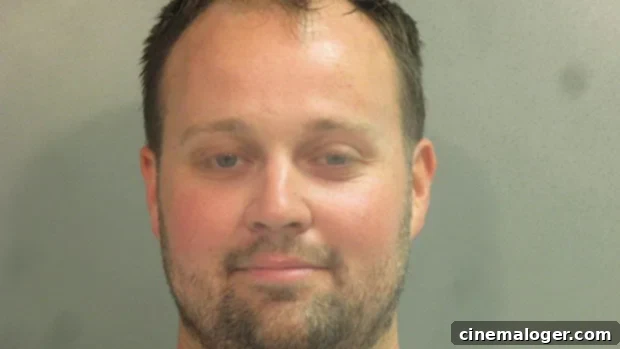Josh Duggar’s Release: Unpacking the Strict Conditions and Lingering Questions in His Child Pornography Case
After a significant week in custody that drew national attention, Josh Duggar, a prominent figure from the reality television series 19 Kids and Counting, emerged from the Washington County Detention Center in Fayetteville, Arkansas. His release on Thursday, May 6, came exactly a day after a judge issued an order allowing him to leave, albeit under a comprehensive and highly restrictive set of conditions and requirements. The 33-year-old had been held in detention since his arrest on April 29, where he was subsequently charged with possession of child pornography. This highly anticipated public appearance marked his first sighting since his mugshot was released, offering the public a glimpse into his changed demeanor and appearance following a challenging week behind bars. The photos and video footage of his exit quickly circulated, highlighting the gravity and public interest surrounding his ongoing legal battle.
As Josh Duggar stepped out into the daylight, accompanied by his attorney, Travis Story, observers noted a noticeable change in his appearance compared to his mugshot taken just seven days prior. He appeared to have grown a short, light beard during his time in custody, a detail that was visible despite him wearing a protective face mask. His attire consisted of a long-sleeved white and red plaid shirt, prominently featuring the University of Arkansas Razorbacks logo on the left chest pocket, paired with classic blue jeans. The father of six exited the detention center around 2:30 PM local time, walking from the facility’s door towards an awaiting vehicle. Despite the mask, his eyes conveyed what appeared to be a happy expression, suggesting a sense of relief at his newfound, albeit conditional, freedom. However, this moment of exit was not without public scrutiny, as a local TV news reporter peppered him with questions regarding the severe child pornography charges he faces. Duggar remained silent, offering no comments to the press as he quickly made his way into the vehicle, leaving many questions unanswered.

While Josh Duggar is technically no longer behind bars, his newfound freedom is far from absolute. He is now living under an extremely stringent set of restrictions that dictate nearly every aspect of his daily life. On May 5, Judge Christy Comstock ruled that the former star of the popular TLC show 19 Kids and Counting would be released into the custody of “designated third-party custodians.” These custodians are identified as Lacount and Maria Reber, who are described as close and long-standing friends of the Duggar family. This arrangement means that Josh will not be returning to his own home immediately but will instead be under home confinement at the Rebers’ residence for a period of two months. The decision to place him with third-party custodians, rather than his direct family, underscores the severity of the charges and the court’s need for strict supervision, ensuring an environment free from potential risks as he awaits his trial. This temporary living situation is a critical component of his conditional release, highlighting the court’s cautious approach.
Beyond the requirement of living under the direct supervision of designated custodians, Josh Duggar’s conditional release is enforced through several layers of monitoring and reporting. He is mandated to wear a GPS ankle monitoring device at all times. This device serves as a constant electronic leash, tracking his movements and ensuring his compliance with the home confinement order. Any attempt to tamper with the device or leave the designated premises without explicit permission would constitute a direct violation of his release conditions, carrying severe legal repercussions. Furthermore, Duggar is required to regularly report to a probation officer. This officer plays a crucial role in overseeing his adherence to all the court-imposed rules, conducting check-ins, and providing reports back to the court. The combination of third-party custody, GPS tracking, and probation supervision creates a comprehensive system designed to keep Josh Duggar under strict surveillance and accountability as his case progresses through the legal system.
Perhaps one of the most delicate and discussed aspects of Josh Duggar’s release conditions revolves around his family. The judge explicitly determined that it was not advisable to release Josh to his own home, where his pregnant wife, Anna Duggar, 32, and their six minor children reside. This decision reflects the court’s paramount concern for the safety and well-being of the children, given the deeply disturbing nature of the child pornography charges. However, recognizing the importance of family connections, the court has granted Josh unlimited access to his own children—who range in age from one to eleven years old—but with a crucial safeguard: Anna Duggar must be present at all times during these visitations. This strict rule ensures that an adult, responsible party is always supervising interactions, providing a layer of protection. Conversely, Josh is absolutely prohibited from seeing any other minor children, including extended family members. This particular restriction underscores the court’s zero-tolerance policy towards any potential interaction with minors beyond his immediate, supervised family, further emphasizing the seriousness of the allegations and the protective measures in place.
View this post on InstagramA post shared by A N N A D U G G A R (@annaduggar)
In a measure directly aimed at preventing any access to illicit content, Josh Duggar is under an absolute prohibition from using the internet or possessing any internet-capable devices. This sweeping restriction includes personal computers, smartphones, tablets, gaming systems, and even Smart TVs. The rationale behind such a severe ban is unequivocally linked to the nature of the child pornography charges he faces, aiming to eliminate any avenue through which he could access, create, or distribute such material. Furthermore, he is explicitly forbidden from viewing any form of erotica, a condition that directly addresses his past admissions. In 2015, Josh Duggar publicly confessed to having a serious porn addiction, which led him to spend six months in a faith-based in-patient rehab facility. These current prohibitions serve as a stringent preventative measure, directly referencing his documented struggles. As standard procedure for serious criminal cases involving potential flight risks, Josh has also been compelled to surrender his passport, preventing any international travel. Additionally, he is forbidden from possessing a firearm, a common safety precaution imposed by courts in cases of this gravity. These combined restrictions paint a clear picture of the tight leash he is on, ensuring maximum control over his environment and activities during this critical pre-trial phase.
The consequences for violating any of these carefully outlined rules are exceptionally severe. Should Josh Duggar fail to adhere to even one of the judge’s stipulations, he could face an additional 10 years in prison, entirely independent of the outcome of his primary child pornography trial. This impending trial, which is currently scheduled to commence in July, represents the next major milestone in this high-profile legal saga. His release on bond, therefore, is not an indication of leniency or a reduced likelihood of conviction; rather, it is a conditional privilege, granted under the strictest terms, contingent upon his unwavering compliance with every court order. The stakes are incredibly high for Duggar, as his very freedom, even in its restricted form, hinges on his ability to navigate this complex web of legal requirements without error, facing the full force of the law if he falters. The July trial will determine his ultimate fate, but until then, his every move remains under judicial scrutiny.
During the May 5 hearing, crucial testimony shed light on the grim details of the allegations against Josh Duggar. Homeland Security Department Special Agent Gerald Faulkner, a seasoned expert in such investigations, provided chilling testimony. He stated that in 2019, a computer located at Duggar’s car dealership office allegedly contained a file with images depicting child sex abuse. Faulkner detailed that the children involved in these images ranged in age from a mere 18 months to 12 years old. In a stark and powerful statement that underscored the horrifying nature of the evidence, Agent Faulkner characterized these images as being “in the top five of the worst of the worst that I’ve ever had to examine.” This testimony painted a deeply disturbing picture for the court, providing a foundational understanding of the serious federal charges Josh Duggar now faces. Such a forceful condemnation from a law enforcement official with extensive experience in child exploitation cases undoubtedly weighed heavily on the proceedings, highlighting the severe gravity of the allegations.
Despite the compelling and disturbing testimony presented by Agent Faulkner, and a direct recommendation from a federal probation officer, Judge Comstock ultimately decided to release Josh Duggar from jail. The federal probation officer had strongly advised the court that Duggar should remain in custody and not be released until his trial, citing concerns that were likely related to the nature of the charges and the potential risk to the community or flight. However, Judge Comstock chose to disregard this advice, opting instead to issue the order for Josh Duggar’s conditional release. This decision to allow release on bond, against the recommendation of law enforcement and probation, has raised questions and drawn significant public attention, highlighting the complexities and discretionary power inherent in the judicial system. It means that despite the severity of the accusations and expert advice, the court found grounds for a supervised, conditional freedom until the legal process fully unfolds. This sets the stage for a contentious trial in July, where the full weight of the evidence will be presented, and Josh Duggar will finally face the full legal process for the charges laid against him.
In conclusion, Josh Duggar’s release from the Washington County Detention Center marks a pivotal moment in his ongoing legal saga. While he is no longer physically incarcerated, his life is now governed by an unprecedented array of strict conditions designed to monitor his every move and restrict his access to potentially harmful elements. From home confinement under the watchful eyes of third-party custodians to a GPS ankle monitor and a complete ban on internet-capable devices, his conditional freedom is tightly controlled. The protective measures surrounding his limited visitation with his own children, coupled with the prohibition from seeing any other minors, underscore the court’s deep concern for child safety. As the July trial looms, these conditions serve as a stark reminder of the gravity of the child pornography charges he faces. The contrast between his family’s once-public image and his current legal predicament continues to captivate and disturb the nation, leaving the public to await the full legal reckoning that his trial promises to deliver.
